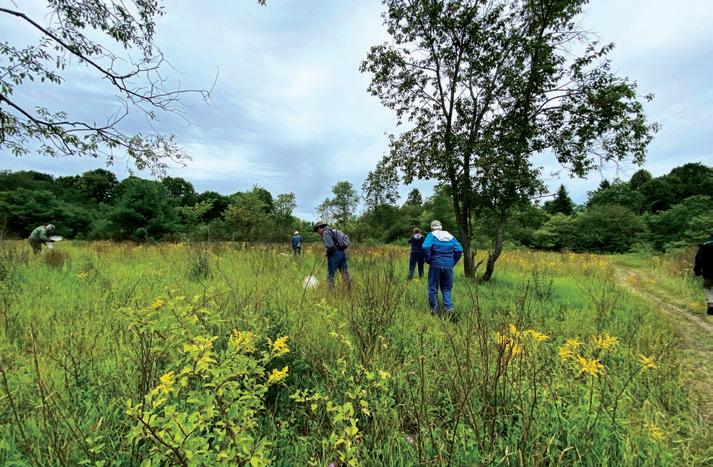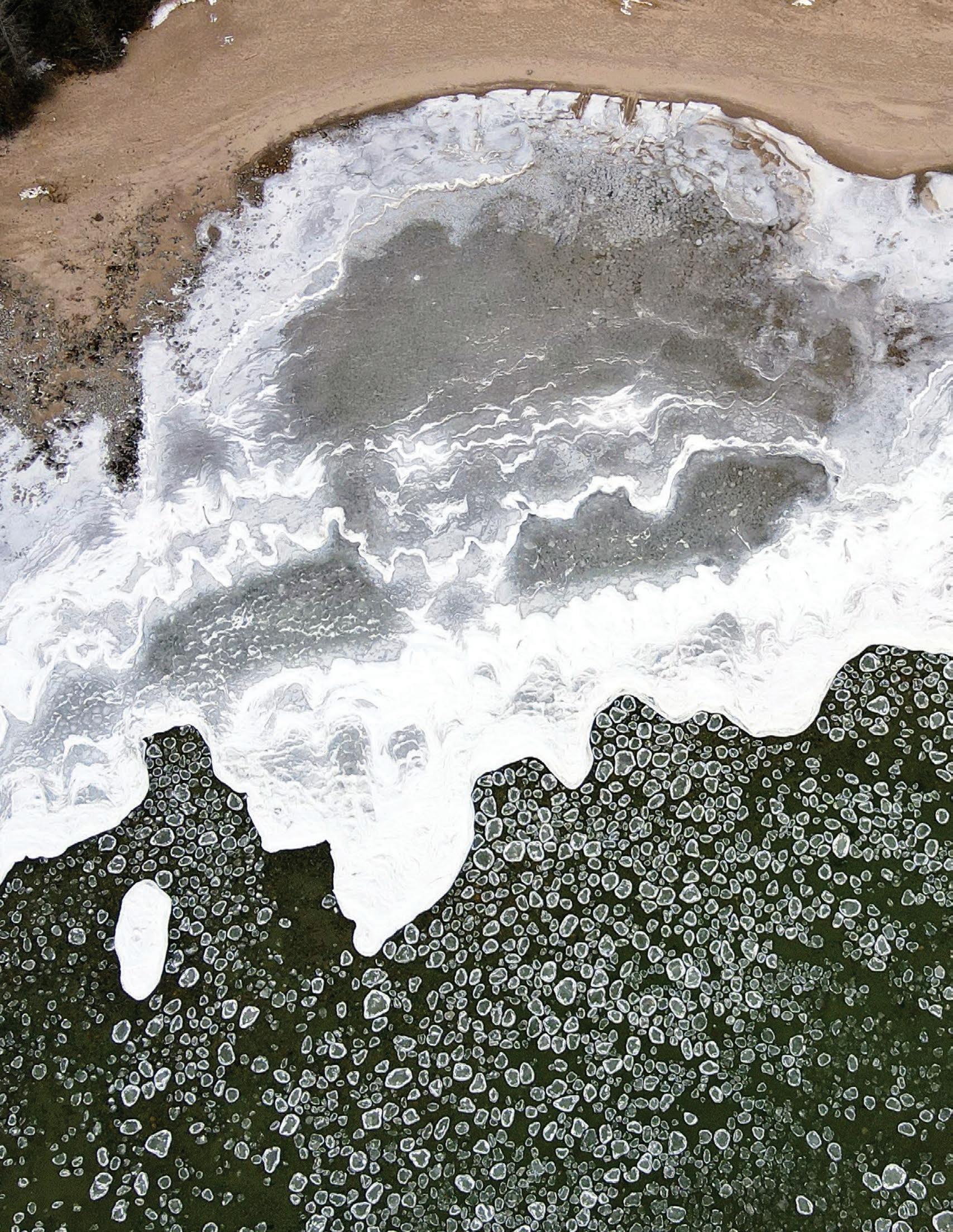
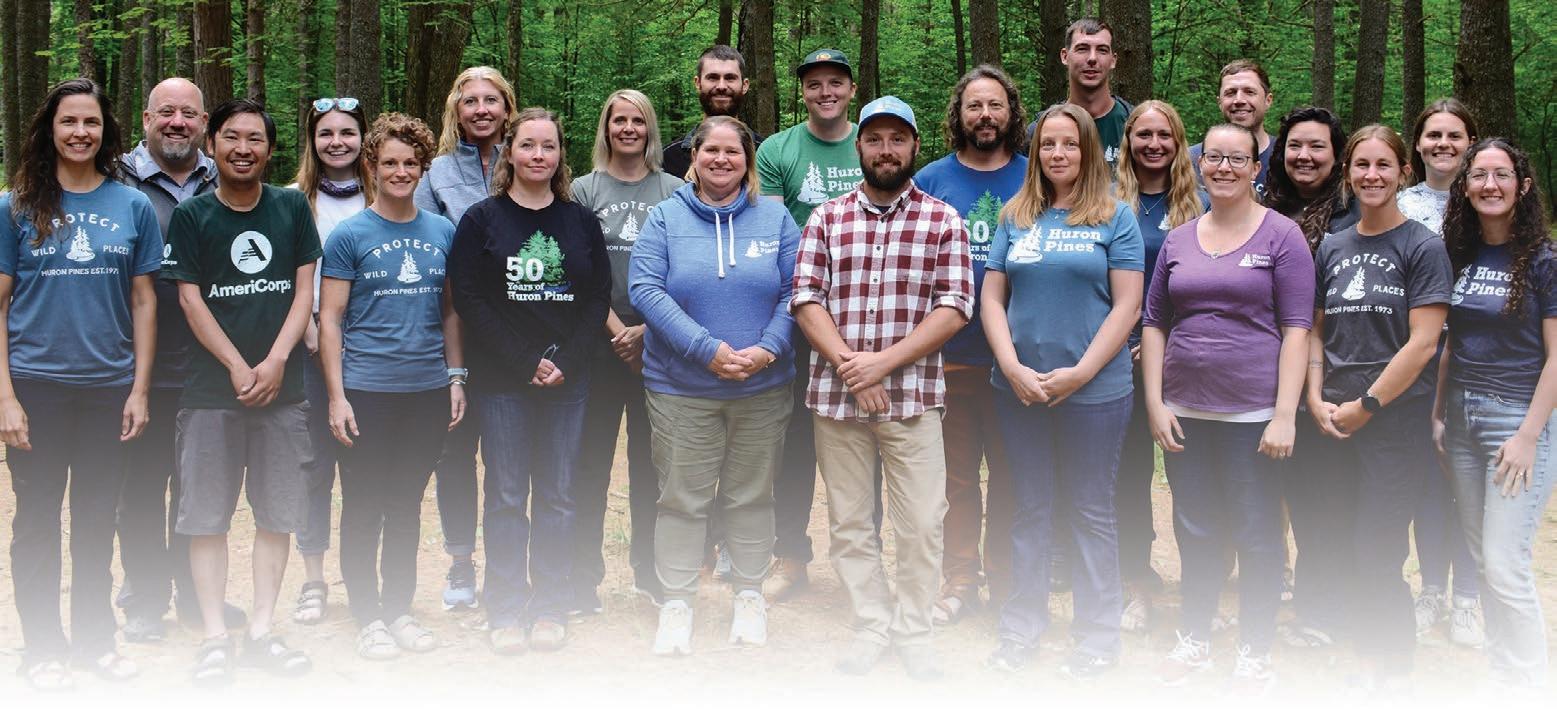



Greg Bator Chair
Jennifer Hill Vice Chair
Meaghan Gass Secretary
Chip Erwin Treasurer
Ned Caveney
Alex Code
Rich Castle
Joe Jarecki
Kim Margherio
Dan O’Connor
Tony Pitts
Jerry Rucker
Donette Spiekerman
Brad Jensen Executive Director
Lisha Ramsdell Associate Director
Shelby Bauer Stewardship Program Coordinator
Julia Butch Land Protection Coordinator
Bryant Eddy Habitat Project Manager
Chris Engle Communications Associate
Abigail Ertel Community Program Director
Logan Hawley Coastal Restoration Team Lead
Amber Hubbard Coastal Stewardship Coordinator
Heather Huffstutler Development Director
Daniel Judd Heartland Restoration Team Lead
Maddie Khuri Community Education Project Manager
Paige Lackey Communications Manager
Josh Leisen Senior Project Manager
Abby Macek Heartland Stewardship Technician
Samantha Nellis Water Program Director
Amy Nowakowski Coastal Project Manager
Tonya Ouillette Office & Data Manager
Nick Theisen Watershed Technician
Amanda Vanaman AmeriCorps Program Manager
Steve Woods Conservation Stewardship Director
Jennie Zoll Director of Finance & Administration
The
As we entered the milestone year of 2023, marking 50 years of incredible support and contribution, we took a moment to celebrate the successes that have shaped Northern Michigan’s landscape. As we embark on our 51st year of service in 2024, the journey to protect and enhance the region’s land and water continues and we are deeply grateful to have you as a vital partner.
Together, we’ve sparked a growing interest in the region, capturing the attention of local communities, civic groups, schools and homeowner associations. This increasing engagement bodes well for the future. At Huron Pines, we’ve leveraged your support to attract and hire talented, skilled staff, expand our funding network and diversify our offerings to address the pressing needs of the communities we serve.
Our approach is rooted in a strategic vision. Huron Pines looks ahead to the next decade, prioritizing projects and places that require our focus. We employ science-based analysis to identify critical needs and foster collaboration. We have meaningful conversations with community leaders and passionate citizens, cultivating enthusiasm and commitment for conservation stewardship. We achieve more and have a greater impact as those relationships continue to grow.
While we’ve made significant strides, our work is far from complete. Future challenges such as water pollution, failing dams, a changing climate and uncontrolled development loom on the horizon. With your unwavering support, Huron Pines will continue to guide responsible efforts to preserve Northern Michigan’s rich natural resource heritage. Whether advising and collaborating with local leaders, advancing evidence-based solutions, conducting field studies, eradicating invasive species, securing funding for conservation or inspiring the next generation of environmental stewards, Huron Pines remains committed to looking ahead—for you and with you.
Reflecting on the past 50 years, we marvel at the miles of rivers running free, the acres of land restored, the shorelines unspoiled from development and the preserves now accessible to the public. In the next 50 years, future generations will reap the benefits of your support as they walk pristine shorelines, catch and release fish once blocked by a failing dam, witness the resurgence of migratory birds and learn from impassioned leaders who carry the torch of environmental stewardship.
Thank you for joining us in this meaningful work today, work that holds profound significance for the tomorrows that will shape the region. We take pride in partnering with you to ensure that Northern Michigan remains the special place we know it to be.
With gratitude,
 Brad Jensen Executive Director
Brad Jensen Executive Director

 Bator Board Chair
Bator Board Chair
 Gregory
Gregory

On a late September evening the air was thick with nostalgia as friends, supporters, colleagues and former staff gathered to commemorate the 50th anniversary of Huron Pines.
The event served as a testament to a half-century of dedicated conservation efforts and our commitment to preserving the natural beauty of Northern Michigan.
As the summer sun set, the celebration shifted indoors where photo displays and a handmade quilt of stitched-together “project shirts” chronicled our organization’s rich history. Shared memories and stories echoed through the crowd, painting a vivid picture of challenges overcome and triumphs achieved in the name of environmental stewardship. We enjoyed live music, local cuisine and a heartfelt program recognizing key individuals who have contributed to our success.
The event encapsulated the spirit of community, commitment and passion which has fueled our conservation efforts over the past five decades and inspired us to continue our mission: to preserve and protect the natural wonders that define Michigan’s landscape.
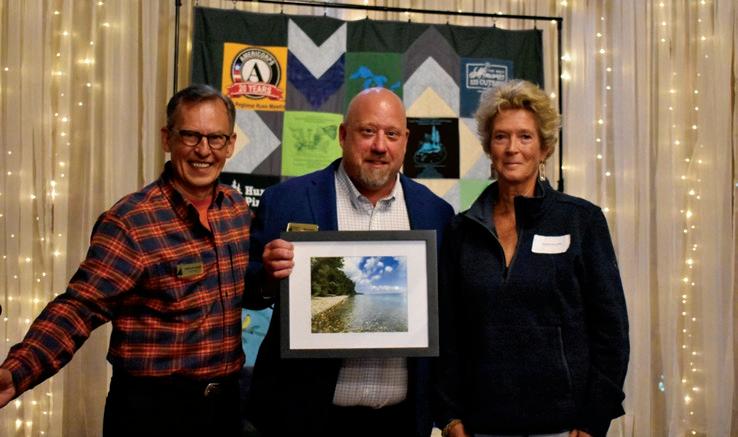
The celebration served not only as a reflection on our remarkable journey but also as the public launch for our Community-Driven Conservation Campaign which will play a vital role in fueling our continued growth and sustainability. We have learned much in the last 50 years but our greatest realization is that our work is most impactful through connections, community and collaboration. As we look to the future, our efforts will be focused on expanding our work in these three areas (learn more about the Community-Driven Conservation Campaign at huronpines.org/donate).
As we embark on the next 50 years, we extend our gratitude to everyone who attended the celebration and expressed their support. Your presence and enthusiasm energizes our mission.
We extend our heartfelt thanks to Blue Sky Barn, Tony Pitts with Cheboygan Brewing Company, Michigan Brew Grayling, Moondance Flower Farm, Henry Gretzinger and musician Todd Aldrich for helping make this evening special.
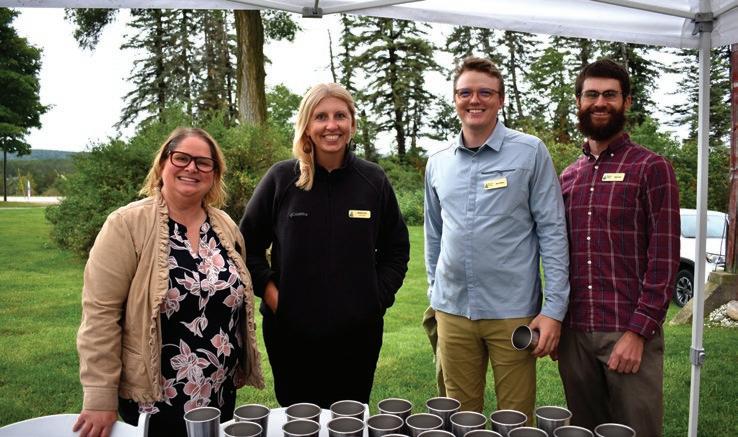 Huron Pines staff Heather Huffstutler, Jennie Zoll, Nick Theisen and Josh Leisen (l-r) greet guests as they arrive.
Supporter Kathy Duffy (r) accepts an award of appreciation on behalf of her family from Board Chair Greg Bator and Executive Director Brad Jensen (l-m).
Huron Pines staff Heather Huffstutler, Jennie Zoll, Nick Theisen and Josh Leisen (l-r) greet guests as they arrive.
Supporter Kathy Duffy (r) accepts an award of appreciation on behalf of her family from Board Chair Greg Bator and Executive Director Brad Jensen (l-m).
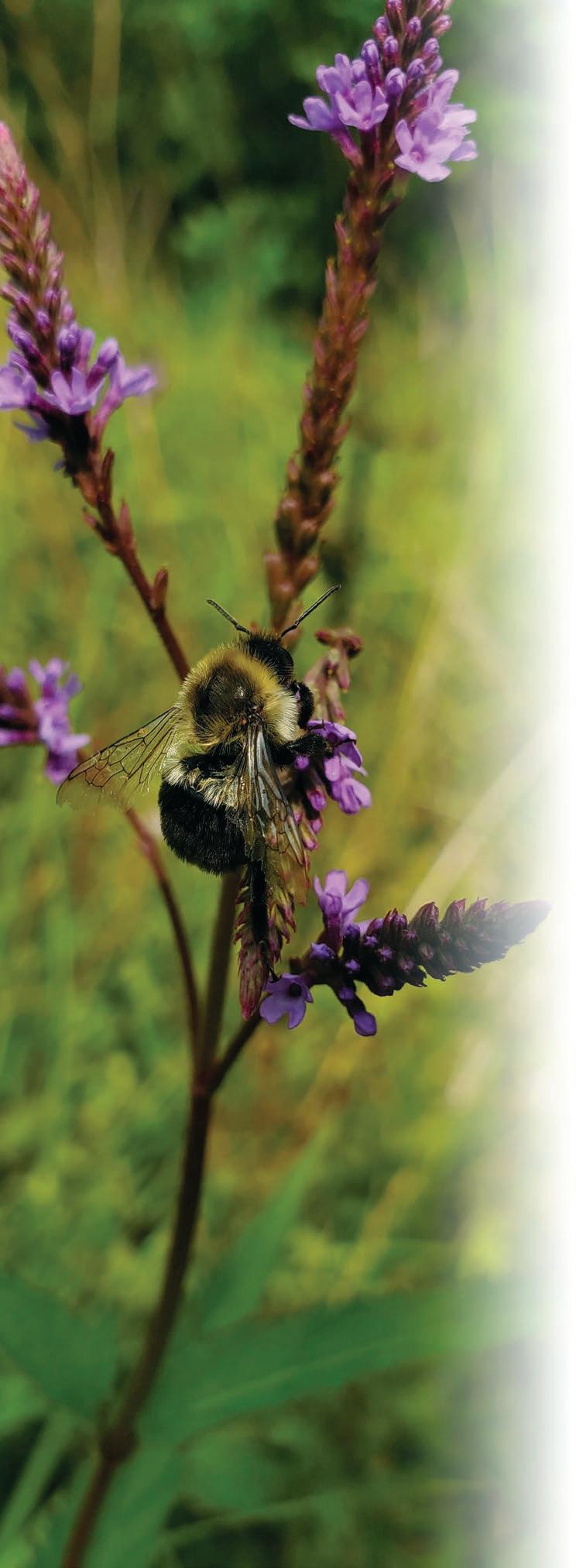
625
2,069
217 volunteer work hours miles of trail built or restored acres of land enhanced through volunteer workdays volunteers engaged
200,000
gallons of stormwater captured from new green stormwater infrastructure installed in 2023
1,000,000
gallons of stormwater captured from green stormwater infrastructure since 2019
12

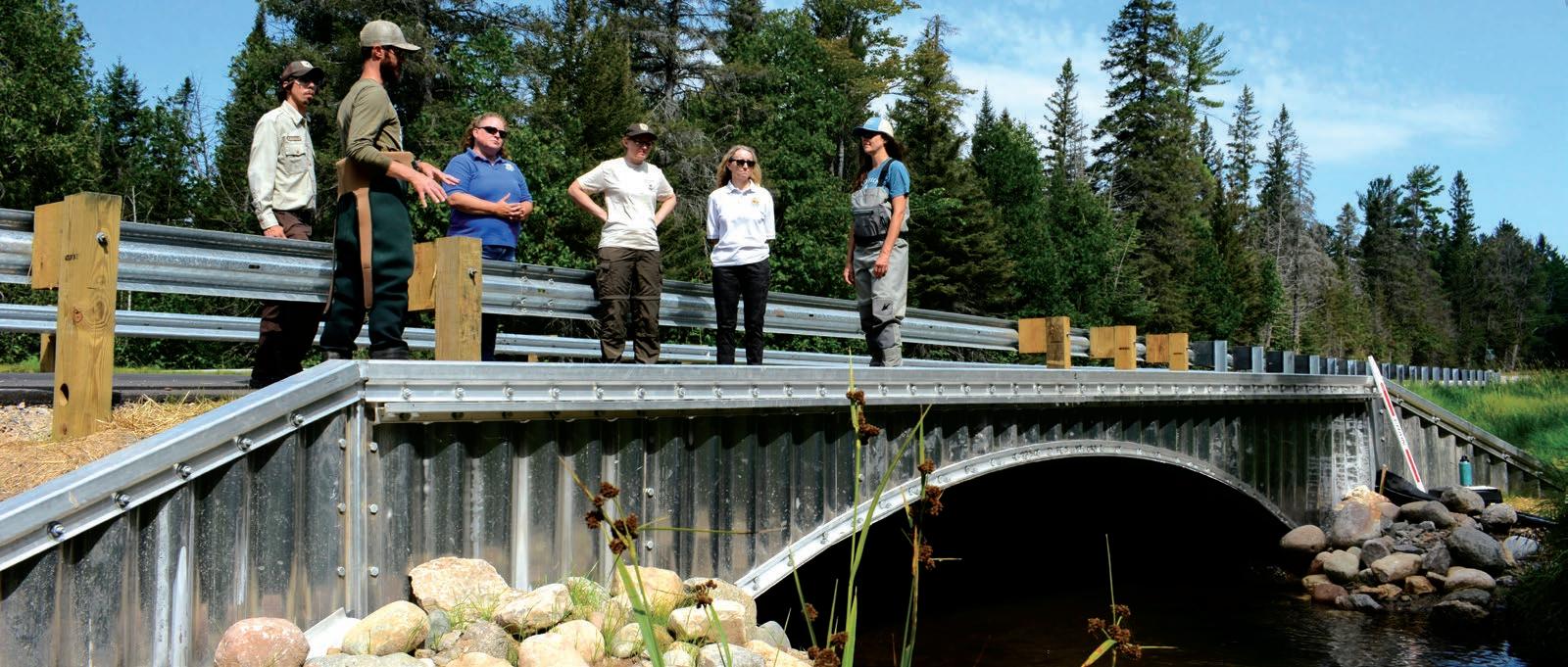
50.2 upstream miles of coldwater habitat reconnected by 5 road/stream crossing replacements
18.5 miles of shoreline monitored for piping plovers
different species of native plant seeds collected

194
sites managed for native and non-native species
16
72 communities directly served

54 miles of shoreline or streambanks restored
1,042 hours of service completed by 23 AmeriCorps members volunteers engaged
37,800
1,050 acres of public land restored

We marked another win for the Lake Huron coast in December by securing the permanent protection of 42 acres and 3,300 feet of riverfront with a land acquisition on historic Hull Island.
Our latest victory preserves space for wildlife and public recreation at the place where the famed Au Sable River meets Lake Huron. It’s as much a symbolic achievement for our organization as it is a practical one, marrying our ongoing work to build a sustainable future for the Great Lakes with a locally-driven effort in a community which shares our values in land and water conservation.
“The permanent protection of Hull Island is a direct result of our vision for conservation driven by engaged and empowered communities,” said Heather Huffstutler, Development Director for Huron Pines. “Community leaders who understand the value of protected places and are motivated to achieve this goal are vital to our long-term success and impact as an organization. This latest acquisition gives us the momentum we need to secure a healthy future for land and water across more of Northern Michigan.”
Recognizing the urgency to protect and ensure public access to undeveloped lands near Lake Huron and the Au Sable River, Oscoda Township initially reached out to our organization early in 2023 for assistance in acquiring the western portion of Hull Island. By purchasing it with donations to our Land Protection Fund, Community-Driven Conservation Campaign and help from The Carls Foundation, we were able to take it off the real estate market and will hold it in our care until the township is ready to receive the property later this year.
Thanks to the support of a grant from the Michigan Natural Resources Trust Fund (MNRTF) board, we will be able to achieve our goal of transferring ownership of this important piece of land to the community of Oscoda. In 2024, the property will officially become the AuSable River Scenic Preserve, owned and managed by Charter Township of Oscoda, with management support from Huron Pines.
This recent success comes less than a year after Huron Pines assisted Alabaster Township with the acquisition of the Lake Huron Coastal Preserve in Iosco County. That effort not only permanently protected
145 acres of mature hardwood forests and 4,000 feet of cobblestone shoreline but also helped us refine the process by which the protection of Hull Island was realized.
Huron Pines will continue working with Oscoda Township after the transfer, assisting with invasive species management, erosion control and the development of light-use recreation infrastructure that balances public access with the needs for ecosystem protection.
“Oscoda Township is very excited about the Hull Island project,” said Township Superintendent Tammy Kline. “We are looking forward to partnering with Huron Pines to preserve this as a natural space for the community to enjoy for years to come.”
 Top: The protected forests and shorelines of Hull Island lie just west of Oscoda.
Top: The protected forests and shorelines of Hull Island lie just west of Oscoda.
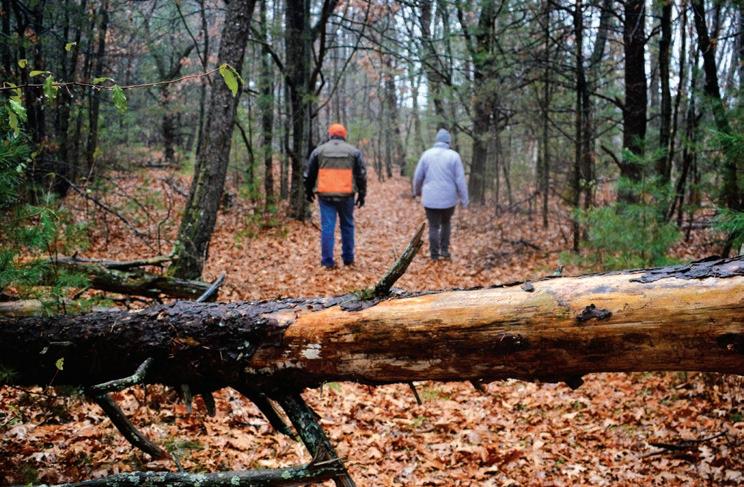
Situated a stone’s throw from downtown, the preserve holds significant recreational value for the community of Oscoda with existing trails winding through oak forests, diverse landscapes and sudden elevation changes, all topped off with panoramic views of the Au Sable River.
Hull Island is also home to local logging history, having gotten its name from Hull Ely Mill which operated nearby and warehoused lumber on the island during Oscoda’s logging boom of the late 19th century. The mill closed and the building became a cannery before the great fire of July 1911 destroyed the structure along with most of Oscoda, according to the AuSable-Oscoda Historical Society.
While hiking there on a damp day in November, two of our staff members found a sandy opening where the ground was littered with earthstar puffballs, a native fungus with the unusual behavior of opening like a flower in the rain to spread their spores. It’s these kinds of discoveries that we hope visitors have as they make their own connections to nature at this unique protected place.
“
The permanent protection of Hull Island is a direct result of our vision for conservation driven by engaged and empowered communities. “
- Heather Huffstutler Development Director, Huron Pines
“The variety of landscapes in a relatively small area paired with elevated views of the Au Sable River really enhance the visitor experience, and it’s all right in the heart of Oscoda,” said Land Protection Coordinator Julia Butch. “This has been a great opportunity to work with a community who shares our priorities in conservation and we’re opening new possibilities with Oscoda Township.”
We continue to connect with local leaders who believe in our mission, therefore making us stronger as an organization. The momentum we have with our Lake Huron Forever initiative and our land protection efforts is growing, particularly along the stretch from Oscoda to Au Gres where there is great potential for shared efforts in land protection, ecosystem restoration and community engagement in conservation.

“Building these deep relationships is highly rewarding because we can complete meaningful projects that are sustainable when we have local support,” said Executive Director Brad Jensen. “This is evident here in the community of Oscoda and we look forward to more good work ahead.”
You can support our ongoing land protection efforts by donating to our Community-Driven Conservation campaign at huronpines.org.
 A network of existing trails wind through the oak-dominant forests of Hull Island.
A network of existing trails wind through the oak-dominant forests of Hull Island.
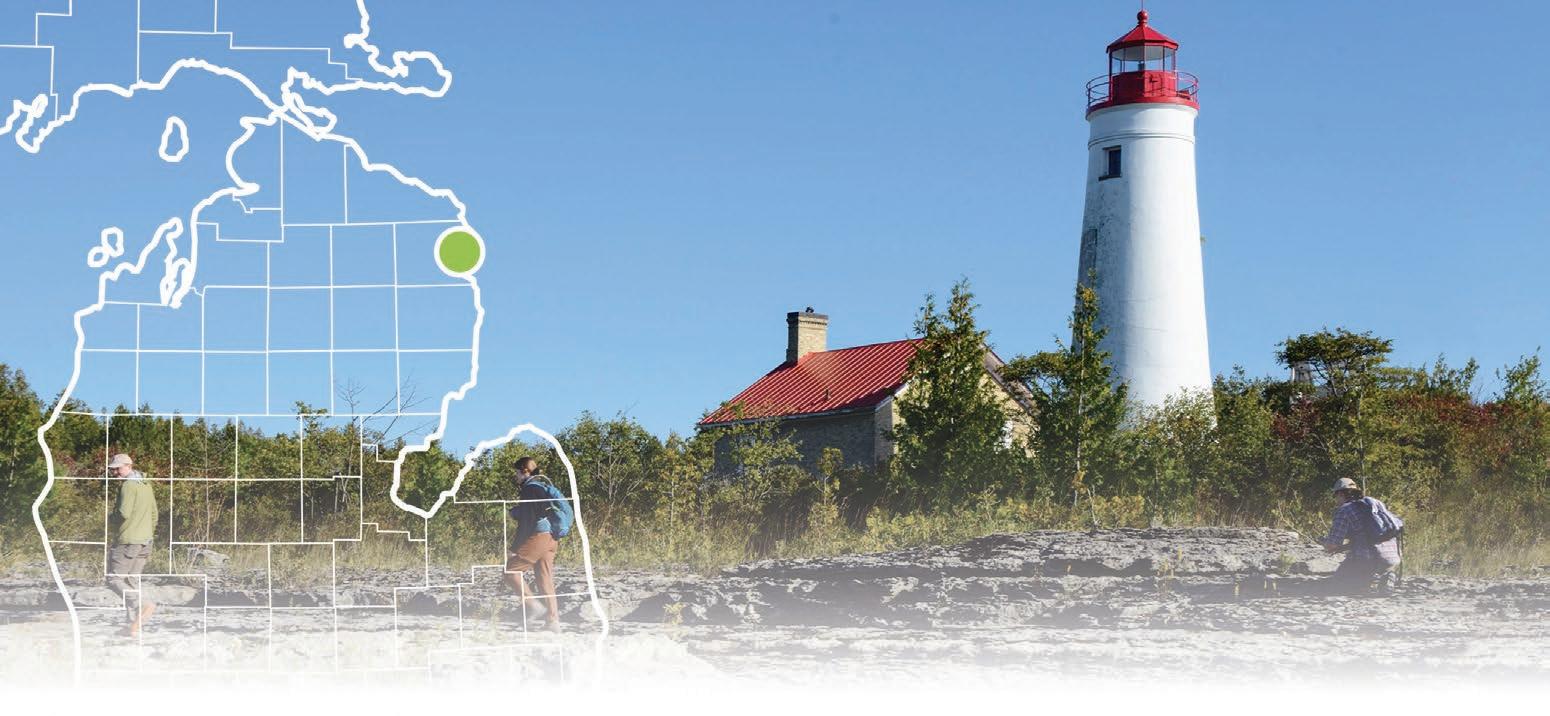
The Township, City and County of Alpena each adopted the Lake Huron Forever Pledge in 2023 as a sign of their individual and shared commitments to water quality protection and community sustainability.
As the largest shoreline community in Northeast Michigan by population and land area, Alpena’s adoption of the pledge marks a major milestone in this binational effort to curb stormwater runoff, protect sensitive natural areas, promote water quality and inspire residents to action.
Developed in 2019 by shoreline community foundations and conservation partners in the U.S. and Canada, the Lake Huron Forever initiative supports the design and implementation of onthe-ground projects which promote community health and climate resilience along the shores of our shared Great Lake. By taking the pledge, Alpena joins two other Michigan communities—Au Gres and Bay City—in this collective and growing effort facilitated by Huron Pines.
To support the City’s pledge, Huron Pines is restoring sand dunes at Mich-e-ke-wis Park in Alpena to build a more resilient shoreline, filter stormwater runoff and restore natural plant diversity to this popular park. The dune restoration project was identified as a priority for residents during a public visioning session Huron Pines hosted in 2022 and directly addresses Alpena’s pledge goals for green infrastructure and coastal resilience.
Huron Pines AmeriCorps members erected temporary sand fencing in August which will catch windblown sand and rebuild the dunes. Native plants were installed in October—including dune grasses transplanted from nearby North Point Nature Preserve—to further establish a natural shoreline that is more resilient to erosion and fluctuations in lake levels.
The planning phase of this project was supported by the City of Alpena, Michigan Department of the Environment, Great Lakes and Energy, the National Oceanic and Atmospheric Administration and an anonymous local donor.
Also in the City, volunteers joined staff of Huron Pines and Thunder Bay National Marine Sanctuary in October to install 1,600 native plants in two rain gardens at the Great Lakes Maritime Heritage Center. The gardens will capture and filter an estimated 50,000 gallons of stormwater annually and serve as a showpiece for the community as plans for similar projects take shape. Students of Posen Consolidated Schools followed up with more planting as part of their field exploration trip studying marine debris and its impacts on Lake Huron.
This project was supported by the National Fish & Wildlife Foundation’s Sustain Our Great Lakes program.
“
It’s rewarding to see the City, Township and County coming together in their commitment to Lake Huron. The pledge is a big step in the coordinated protection of the health of our communities and our shared natural resources. “
- Samantha Nellis Water Program Director, Huron Pines
Huron Pines
Our team completed a Natural Features Overlay for Alpena Township, identifying rare landscapes found only in the Great Lakes region and mapping their locations throughout the township. Designed to protect critical wetland, riparian and lakeshore ecosystems and the species which define Northern Michigan, this map tool will be referenced by Alpena Township to supplement existing zoning rules and further protect sensitive habitats from development as it updates its Master Plan in 2024. Funding is provided by the Michigan Coastal Management Program, Water Resources Division, Michigan EGLE and NOAA.
We also completed extensive road surveys throughout Alpena County —783 road miles in total—to locate and record invasive plants like autumn olive, phragmites and purple loosestrife. These reports raise public awareness of invasive species, provide a decision support tool for landowners and land managers, and empower local leaders to become more involved with invasive species management. Alpena County has prioritized managing invasive species and expanding outdoor recreation opportunities, like trails, as part of its Lake Huron Forever pledge. This effort is supported by the National Fish & Wildlife Foundation’s Sustain Our Great Lakes program.

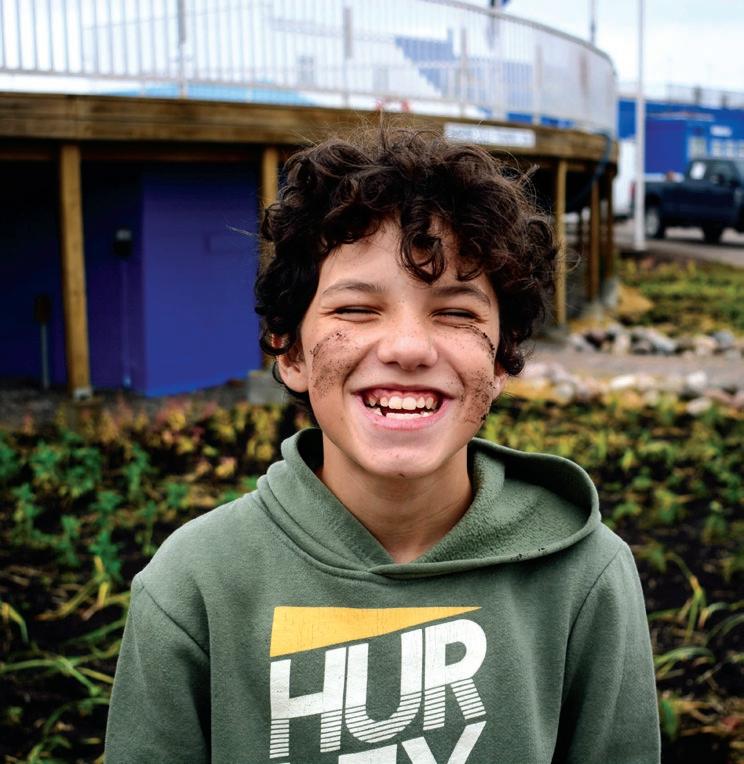

H uron Pines continues to support a statewide effort to promote clean sources of municipal drinking water by improving the overall health of Michigan watersheds.
The City of Alpena draws its water from Lake Huron which is directly influenced by the Thunder Bay River. In support of the City’s pledge goals, we are working with Alpena’s water utility to implement their Source Water Protection Plan, identifying areas in the watershed where on-the-ground projects can have the greatest impact on improving water quality. We’re also working to raise public awareness of how healthy forests and watersheds help ensure safe, clean drinking water.
Through a statewide program called Forests to MI Faucets, Huron Pines is leading an effort to bolster the tree canopy by planting a diverse mix of 5,000 trees on public and private lands across the Thunder Bay River Watershed in 2024. Trees can considerably improve water quality by reducing runoff of polluted stormwater into streams and rivers which flow into Lake Huron. Forests to MI Faucets is a Michigan DNR program funded by the USDA Forest Service.

Our roots run deep in the sandy soils of the Au Sable River Watershed. It’s where we planted ourselves as a budding conservation organization in 1973 and, a half century later, it remains at the core of our efforts to protect and restore Northern Michigan’s landscapes and help communities connect to nature.
In 2023 we engaged volunteers in the ongoing control of invasive purple loosestrife on the North Branch, restored floodplain habitat of the untamed Mason Tract on the South Branch and employed 2,000 beetles to eat invasive plants on the shores of Mio Pond. Through these efforts and more, Huron Pines is protecting native ecosystems of Northern Michigan’s interior counties and expanding our toolkit to restore more habitats across the broader region.
Barberry Removal Restores ‘Mason Tract’ Floodplains
A wild stretch of the Au Sable’s South Branch renowned for its hiking, fishing and old-growth forests is regaining some of its natural feel once lost to a noxious invasive plant.
Our Stewardship Team ventured deep into the Mason Tract to eliminate Japanese barberry, a highly disruptive invasive species, from this protected forest. Specially managed by the DNR’s Grayling Forest Management Unit, the 4,500-acre Mason Tract is home to the Midwest’s premier trout waters. Hiking and skiing trails here pass through some of Michigan’s oldest forests and attract recreational visitors year round.
Its lowlands also have a substantial barberry problem which reveals itself in small clearings where sunlight can reach the forest floor. These shrubs grow fast, crowding out native growth and creating an environment where rodents and ticks thrive. Like other invasive species, no natural control measures exist here to keep barberry in check, making control essential.
Our Stewardship Team managed 75 acres of the Mason Tract for barberry in 2023. Removing it from the upper watershed keeps the infestation from spreading to the Main Branch Au Sable where barberry hasn’t yet gained footing. Ongoing management in 2024 and beyond will be made more effective with the help of community volunteers. Opportunities to lend
a hand and help protect the Mason Tract will be posted on our website throughout the year.
This project is funded in part by the USDA Forest Service’s Cooperative Weed Management Area grant program and the National Fish and Wildlife Foundation’s Sustain Our Great Lakes program.

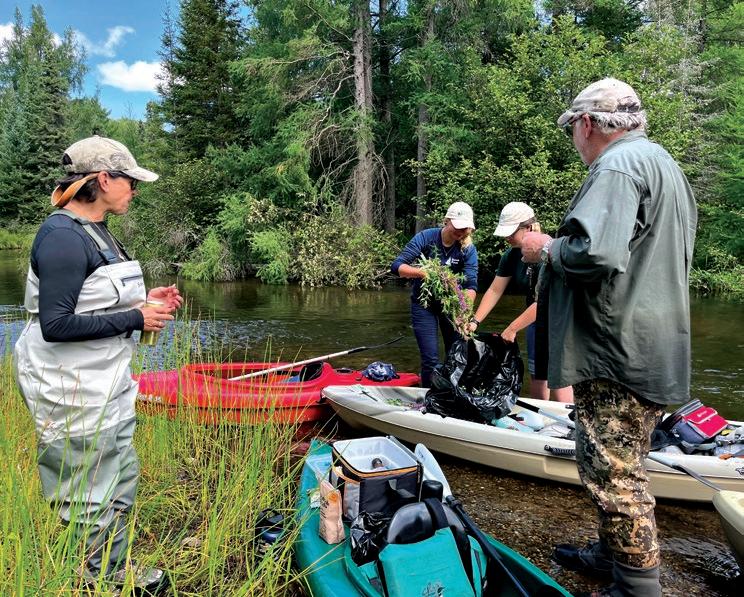
Volunteers with the Au Sable North Branch Area Foundation continue to play an essential role in ongoing efforts to control the purple loosestrife population on this waterway near Lovells.
A handful of volunteers joined us this summer for two days of floating and wading a total of 17 miles of the North Branch Au Sable River, clipping and bagging the flowering heads of purple loosestrife to prevent it from going to seed. These long and labor-intensive workdays have proven highly effective at reducing the amount of purple loosestrife growing on this stretch of the river and limiting the dispersal of seeds to downstream habitats.
“We’ve noted a difference since 2020 when we began this annual management,” said Stewardship Program Coordinator Shebly Bauer. “With the help of volunteers, we managed more sites than ever in 2023 and the overall amount of loosestrife is dropping, so we know this work is making a real impact.”
This project is funded in part by the Michigan Invasive Species Grant Program and a contribution from the Au Sable North Branch Area Foundation.

Stewardship Program Coordinator Shelby Bauer and Huron Pines AmeriCorps member Victor Ma trekked to Mio Pond in July with a cargo of 2,000 live beetles. Nestled among them in her carseat was Bauer’s young daughter, tagging along for an unconventional attempt to control one of Northern Michigan’s most noxious invasive plants. The following is Bauer’s personal account of that day.
Looking in the backseat and seeing my two-year-old asleep, surrounded by purple loosestrife plants crawling with Galerucella beetles, two thoughts struck me: My career at Huron Pines is really important, and I am a great mom. While immersing my child in a bug-filled bouquet might seem like unorthodox parenting, it is exactly this kind of unique approach we should take to be better land stewards—and it’s the one I choose in raising the next generation of conservationists.
“ “
These projects show the power of our efforts in early detection and rapid response to invasive species and highlight the essential role volunteers play in maintaining the wild places they love.
- Steve Woods Conservation Stewardship Director, Huron Pines
Adaptive management means learning by doing. We have tried proven but labor-intensive methods, like hand-pulling plants, to manage purple loosestrife at Mio Pond with mixed results. Advancing the conservation of this waterbody means adapting to challenges and adding new strategies to our invasive species management toolbox.
Galerucella larvae and adult beetles feed only on purple loosestrife, a perennial plant. Feeding en masse, they can kill individual plants and have been used with some success in ecosystems where natural controls are absent. We strategically placed seven potted loosestrife plants—each teeming with 300 beetles—around Mio Pond that day and mapped their locations to monitor the beetles’ impact on the loosestrife population as they disperse and feed.
While controlling purple loosestrife in this watershed is one goal of this project, another is expanding our toolkit for broader invasive species management. I hope all involved—including my own child— learn from this experience and feel empowered to build a more sustainable future for Northern Michigan.
This effort is supported by the U.S. Forest Service and Michigan DNR through the Good Neighbor Authority program.
Huron Pines is leading a major dam removal project in Rose City and the community will determine what features a new park at the site will have.
“Sanback Dam is well past its life expectancy and needs to come out,” said Senior Project Manager Josh Leisen. “It is right to do the removal in a controlled way and give the community a say in what the site will become.”
At different times in its history, Sanback Dam powered a sawmill and a gristmill. For the last half century though, the crumbling concrete structure has served no use and its deteriorating condition poses a hazard for Houghton Creek, a tributary of the Rifle River which is one of Michigan’s 16 designated Natural Rivers. It also poses a high risk to human safety. The dam and surrounding property is owned by Rose City.
A grant awarded to Huron Pines in 2023 by the Michigan Department of Environment, Great Lakes & Energy (EGLE) is funding our permitting and design phase in 2024. As part of that process, we’re gathering input from Rose City community members regarding the planned removal of the dam, and potential renovations and features to be incorporated in the adjacent city park. Residents will have several public opportunities to provide input and weigh in on design options and future use at the site.
Dam removal and site restoration is planned for 2025 and is estimated to cost $4 million.

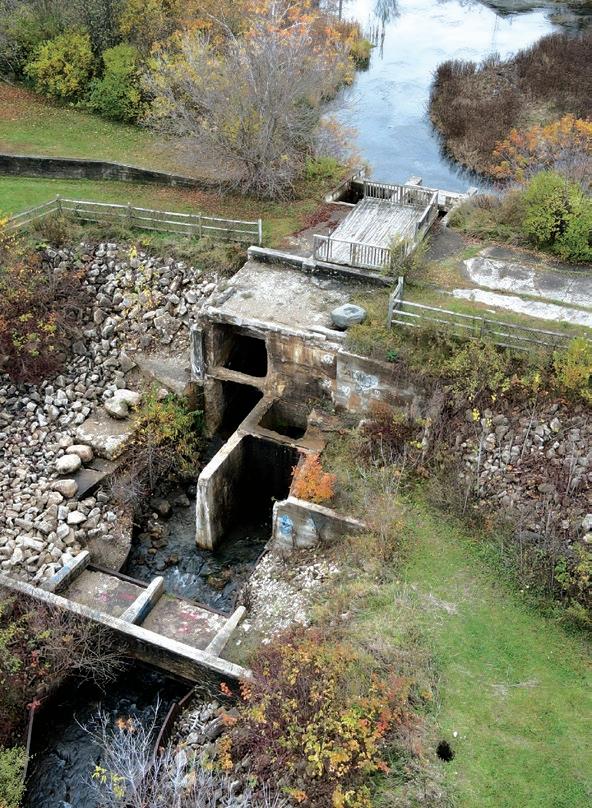
In August, biologists with the U.S. Fish & Wildlife Service (USFWS) conducted an electrofishing survey at our newly restored Sparr Road crossing on the Black River. Assisted by our Coastal Project Manager Amy Nowakowski, the survey netted more than 200 brook trout in the vicinity of the crossing, showing the heavily-wooded stream to be in good health. The successful survey demonstrates the importance of access to cold-water upstream habitats for this native fish.
Two undersized culverts were pulled from the river at Sparr Road in late spring and replaced with a single bottomless arch span. By removing this barrier, we restored fish passage to 9.2 miles of stream at the southern edge of the Pigeon River Country State Forest while virtually eliminating the risk of road washouts.
“Fish of any size and age class can now pass through the crossing as if the road isn’t even there,” Nowakowski said. “This is so important for the river’s wild brook trout population and for maintaining a healthy watershed overall.”
It’s the latest in a series of projects we’ve led on the Black River over the last three decades. In total, we’ve reconnected 62.6 miles of this watershed, restoring access to important upstream habitats for its famed brook trout fishery while making the region more resilient to the impacts of climate change.
This project was funded by the National Fish & Wildlife Foundation’s Sustain Our Great Lakes program, USFWS’ National Fish Passage Program and the Michigan DNR’s Fisheries Habitat Grant Program. Additional partners include Huron Engineering & Surveying, J.E. Tiffany & Sons, and Otsego County Road Commission.
Huron Pines is working to conserve piping plover nesting habitats along the northern Lake Huron coast while volunteers keep an eye on breeding pairs of this endangered shorebird.
Piping plovers require specific shoreline habitats which are increasingly rare due to encroaching development and invasive species—only 80 breeding pairs nested in the Great Lakes region in 2023, a record high but far from the U.S. Fish and Wildlife Service (USFWS) recovery goal of 150 pairs. With the support of a Great Lakes Fish and Wildlife Restoration Act grant through the USFWS, our staff evaluated sites along the coast and on several islands to identify potential nesting sites and to prioritize historic breeding sites for restoration and management.
Marge Pestka, of East Lansing and Tawas, was our leading piping plover monitor in 2023. With help from the AuSable Valley Audubon Society and the Great Lakes Piping Plover Conservation Team, Pestka kept watch over a nested pair and their chicks at Tawas Point State Park. Their dedication helped the pair fledge two chicks and facilitated the release of four more captive-reared chicks at Tawas Point.
“It’s quiet and peaceful, and gives me time to think and focus on one thing: learning about these birds,” Pestka said about her time spent on the dunes of Tawas Point.
Our efforts in 2024 will involve managing invasive plants in the areas identified in our habitat assessments along with ongoing monitoring, native dune plantings and stewardship of potential nesting sites on public and private lands.
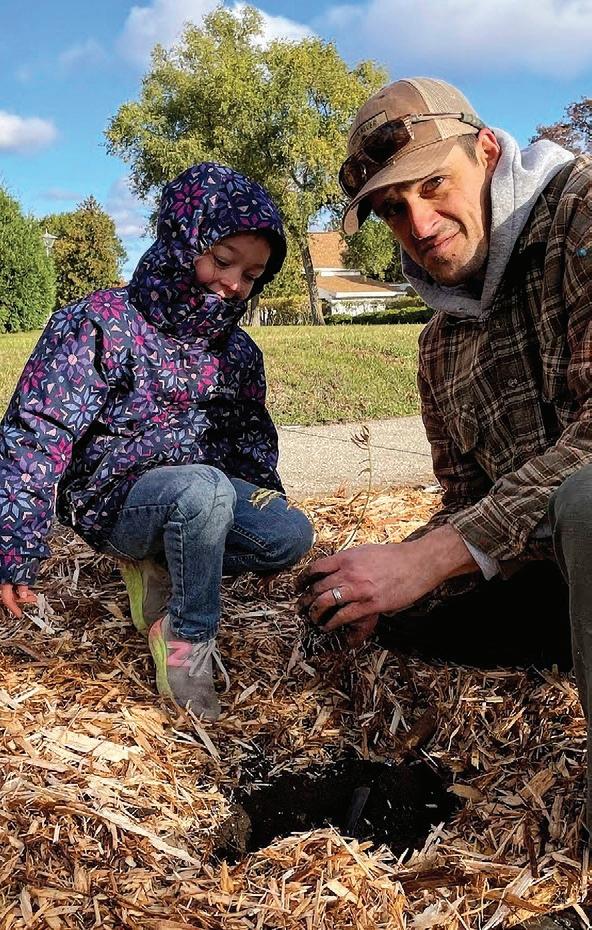

New rain gardens installed along Michigan Avenue in Rogers City will capture and filter an estimated 150,000 gallons of stormwater annually, effectively removing harmful pollutants before they can reach Lake Huron.
These gardens are the first in a series of green stormwater infrastructure installations the Nautical City has planned alongside Huron Pines to build a more sustainable future for Lake Huron and reduce the load on the city’s aging underground storm sewer system.
In October, city staff, volunteers and the school robotics team planted a native mix of wildflowers and grasses along both sides of Michigan Avenue between Fifth and Fourth streets. Cutouts in the curb will allow stormwater to flow off the street into the gardens where deep-rooted native plants and sandy soil will filter it, keeping pollutants like road salt and motor oils out of the harbor at the end of Michigan Avenue.
“Water quality is a priority for Rogers City,” said Samantha Nellis, Water Program Director for Huron Pines. “This is their first major green infrastructure project and the community is building momentum for more to come.”
City partners are looking to add more green space and stormwater capture to Michigan Avenue, from Third to Lake streets, as early as 2024.
This project is supported through Huron Pines by the National Fish & Wildlife Foundation’s Sustain Our Great Lakes program and is part of the multinational Lake Huron Forever initiative.
Huron Pines thanks its many supporters, agency project funders, foundations and business partners for contributing to the success of our work. Throughout 2023, we not only reinforced a robust foundation for sustaining future efforts but also expanded our portfolio of community conservation projects. The established financial strength empowers Huron Pines to address emerging resource challenges, harness local support for larger initiatives and increase investments in the communities we serve.
The Five Year Revenue Trends graph displays the steady growth of our revenue and program expenses in the past five years. With nearly 200 project grants and contracts each year, and with programs reaching communities across Northeast Michigan, we anticipate continued growth in revenue and program expenses. The value of land acquired in any year is also depicted in Total Revenue, accounting for a higher than normal year in 2022.
Program Expenses for 2023 graph shows our expenses related to implementing on-the-ground projects. Major projects, like removing a dam or acquiring a new preserve, create differences each year. Shifts in staff resources can also create slight changes year over year in these program areas.
Five Year Net Assets Trends graph shows that Huron Pines asset growth continues to be driven by permanent land protection assets and the growth of our endowments. Both speak to our commitment to sustainability long term.
Through sound financial management practices, the generosity of our supporters and the work of our volunteers, staff and board members, we’re ensuring that Huron Pines will be here for generations to come. Thank you for your support!
*Huron Pines is independently audited each year. More detailed information is available upon request.
Help us secure the region’s conservation future and Huron Pines’ sustainability by making a planned gift or supporting one of our endowment funds. These types of contributions make a meaningful impact on the future of the Great Lakes region by ensuring the financial security required to continue our work for generations to come.
You can support our organization with a gift to one of our established endowment funds.
The Huron Pines Endowment Fund is designed to support operations of the organization. This endowment helps to ensure our long-term sustainability and programs.
The Huron Coastal Stewardship and Conservation Fund was established in 2022 to support the growing need for stewardship and permanent protection of special areas in our Lake Huron Coastal Priority Area. This fund, developed with help from The Nature Conservancy, will support the long-term stewardship of protected lands in this priority area as well as assist with future land protection needs.
We encourage supporters to call our Executive Director, Brad Jensen at (989) 448-2293 x 18 to discuss a gift to one of these endowment funds. Both funds are held and managed by the Community Foundation for Northeast Michigan.
To make a gift of any kind to Huron Pines is an act of generosity. To make a planned gift – one that helps us thrive long-term – is a powerful way to give once, forever.
Bequest, Living Trust or Charitable Trust:
Ensure that Huron Pines receives a valuable interest through your estate plans, either during life or after the passing of a donor. These valuable interests may include full title to land, partial interests in land, stocks, or cash.
Required Minimum Distribution or Qualified Charitable Distribution (QCD):
For anyone 70 1/2 and older, you are required to make an annual minimum distribution from your retirement plan. Minimum distributions can easily become donations to Huron Pines and provide you with significant tax advantages.
Life Insurance Beneficiary:
You can name Huron Pines as the beneficiary of a life insurance policy, just as you can name people beneficiaries. Because you can name more than one beneficiary, you can divide the benefit among your loved ones and a charity.
“
I believe wholeheartedly in endowment funds and the work of community foundations. Supporting the Huron Pines Endowment Fund allows me to give gifts that guarantee the future of Huron Pines as well as the community impact. “
- Beach Hall


Our Community-Driven Conservation Campaign is about impact and longevity. By empowering the communities at the heart of the region’s most special places to take action, we can create a conservation legacy that is bigger than any single project. Whether you’re a resident, visitor, public official or volunteer, your connections to these special places are what truly inspire meaningful, lasting change. We have learned so much in the last 50 years but our greatest insight has been understanding that positive change happens through connections, community and collaboration.
Since publicly launching our Community-Driven Conservation Campaign in the fall of 2023, we have advanced this vision through the following:
Huron Pines is leading the way in restoring Lake Huron islands, which make up only 1% of land area in Michigan but account for 9% of all recorded instances of rare species and species of conservation need. The islands support biodiversity, maintain ecological balance and contribute to the overall health of the region’s ecosystems. We have begun restoration work and have more planned on Scarecrow Island, Thunder Bay Island, Grass Island, Crooked Island, Bois Blanc Island, Bird Island and Big Charity Island. This work is done in collaboration with local volunteers and community members, agency partners and local leadership. This project is funded by the Great Lakes Fish & Wildlife Restoration Act.
Coast Watchers, a community science monitoring program focused on the health of Lake Huron, ran for its second year at Huron Pines. In partnership with the Lake Huron Coastal Centre in Ontario, Canada, participants were trained to record air and water temperature, seasonal changes in water levels, and occurrences of sensitive or invasive plants, fish die-offs, storm damage or pollution. We had 22 volunteers participate in 2023, gathering data to improve our understanding of the health of our shared Great Lake. This information guides restoration efforts on both coasts while engaging local volunteers in direct science. New this year, we added an opportunity to conduct frequent monitoring at potential piping plover nesting sites (see pg. 13) during their migration from the first week of May to the last week of June. It is through experiences like these that volunteers become local leaders and advocates for restoration, protection and recreation along Lake Huron. Our engagement efforts are supported in part by a Consumers Energy Foundation Planet Award.
Huron Pines is leading the protection and management of five nature preserves totaling nearly 2,400 acres across the region. In partnership with coastal communities, we are increasing access to nature through planning for innovative access to special wild areas including Hull Island, Lake Huron Coastal Preserve and our own North Point Nature Preserve and the KR Poljan Tract at Birdsong Bay. This work in coastal communities paired with Lake Huron Forever action creates a full spectrum of community conservation.

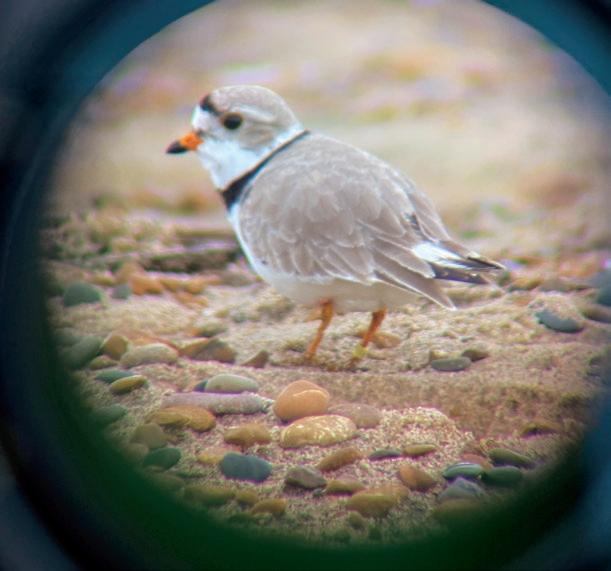

Thank you to all of our 2023 supporters
Acorn Family Retreats
Guy and Angela Adamec
The Adamo Family
Ruth Addis and Marj Schloff
Albanese Family Fund at Fidelity Charitable Donor-Advised Fund
Regina Amidon/Richard Bryan Charitable Fund at Bank of America Charitable Gift Fund
Bill and Debi Anderson
Robert Andrus
Ann Arbor Trout Unlimited
Ann Arbor T-Shirt Company
Anonymous (31)
The Cathy and Bob Anthony Fund at the Community Foundation for Southeast Michigan as suggested by Mr. and Mrs. Robert L. Anthony IV
Caryl and Russ Anton
Scott Appleton
Au Sable North Branch Area Foundation
Au Sable Valley Audubon
Richard L. and Marilyn K. Augustine Foundation at Renaissance Charitable Foundation
Richard and Marilyn Bachelor
Barb Baity-Van Haren
Martin and Michelle Baker
Eric Bankhead
Karen Barton
Al Bartow
Gregory and Cecilia Bator
Don and Liz Bauman
Bay Area Community Foundation
Jonathon Beard
Susan Beede & Jay Copeland Fund at Renaissance Charitable
Bennethum’s Northern Inn Restaurant
Jan and Alan Bersted
David and Elaine Billmire
The Frank W. Lynch and Roberta Jane Lynch Endowed Family Fund at the Community Foundation for Southeast Michigan as suggested by Ms. Sally L. Binard
Sally Binard
Cathy Boatin
Kathleen and David Boyd
Carolyn Jean and Dan Braden
Carol Brand
Paul and Mary Bray
Norm and Valerie Brecheisen
Sarah Brennan-Peeters
Christopher Brierley
Ernest Brumbaugh and Carole Mueller-Brumbaugh
Carl Buchner
Jim and Gina Burke
Don Burkley
Al, Pat and Doug Cambridge
The Carls Foundation
Don Carpenter
Richard Castle
Ned and Mary Caveney
Cedars for the Au Sable
Center for Large Landscape Conservation
Cheboygan Brewing Company
Colby and Tim Chilcote
Bill Chown
Citizens National Bank
The Glory to God Giving Fund at National Christian Foundation Michigan, as recommended by Mr. and Mrs. Larry Clark
Community Foundation for Northeast Michigan
Mr. & Mrs. O.B. Eustis Memorial Fund
Gina Concezzi
Pam and Tom Conquest
Emma Conrad
The Conservation Fund
Saginaw Bay Watershed Initiative Network
Conservation Partners LLP
Consumers Energy
Consumers Energy Foundation
Planet Award
The Anna Owens and Tom Cook Charitable Fund of the Bank of America Charitable Gift Fund
Jill Cooper
Michelle and Eric Cornish
Robert and Judy Cosgriff
Richard and Rebecca Counsellor
Mitchell Courier
County of Alcona
County of Oscoda
Ann and Richard Craig
Richard and Penelope Crawford
Deirdre Curran and Roger Anderson
Michael and Terri Cwik
Anne and Daniel Danosky
Dart Foundation
Gary and Judy Dawley
Janet Deline
Dan and Kandy Dennis
Diane Dennis
William R. and Mary Elizabeth Derwin
Janiene DeVinney
Patrice DeVinney
Nancy Dextrom
Cynthia Dodick
Patricia Donath
Antonio and Teresa Dorta
Rosemary Downer
DTE Energy
Katherine Duffy
Susan Duncan and Larry Van Wagoner
Rick and Sharon Engstrom
The Chip and Betsy Erwin Family
Dale and Norma Ewart
Marsha Fales and Doug Wright
Larry and Pat Farris
Ruth Favro
Roger and Mary Fechner
Larry and Vickie Fields
Michael and Cathryn Fields
Fischer Insurance Agency
David Fisher and Esther Cavendish-Fisher
Jed Fisher
Robert Flickinger
Christopher and Laura Fluke
Mike and Maureen Foresman
Jim and Sue Francis
Belinda Friis
John and Wendy Frye
Terry Gallagher
Paul Gambka
Jeff and Kristin Gandy
Carol and James Garlo
Meaghan Gass
George “Sandy” Duffy Charitable Trust
Robert Gillenwater
William Glass
Leo Goddeyne
Rusty and Elizabeth Gowland
Michael Goyne
Chris and Elaine Graham
Grand Traverse Band of Ottawa and Chippewa Indians
Mike and Christine Grant
Jim and Shirley Graves
Great Lakes Fishery Commission
Great Lakes Fishery Trust
Tom and Joann Green
Jeff Greene
Jim and Linda Gregart
Ken and Elizabeth Gribble
Mark and Susan Griffin
Pamela and Thomas Griffin
Kim and David Gildner
Grinsdesign, LLC
Peter and Virginia Gustafson
Beverly and James Haas
Hack Family Foundation, Jan and Talbot Hack, within the Raymond James Charitable Endowment Fund
Rick and Robin Hagopian
Beach Hall
Mary Haws
Blair and Sandra Marie Headrick
Michael Heath
Anne Marie Heckman
James and Rebecca Heindl
Jerry Heinrich
Matthew and Katherine Heller
Arnot and Erin Heller
Dick and Judy Henry
Lynde Herzbach
Don and Joann Hester
Keithetta Hicks
Russ Hicks
Hill Family Charitable Fund at Schwab Charitable
Margaret Hoerner
Mark Holmen Family Fund at The New York Community Trust
National Philanthropic Trust as recommended by Anne Honhart
Hougen Foundation
William Houston
Todd Howser and Nickie Palumbo
Carl and Vicki Hueter
Heather Huffstutler and Shaun Ulrich
Steve and Jacquelyn Huffstutler
Huron Engineering and Surveying, Inc.
Timothy and Kristine Ianitelli
Elizabeth Jacob
Kristen Jacobsen-Harm
Curt and Susan Jansen
Jansen Family
Joe and Judi Jarecki
Marty and Ellen Jones
Gail Juppenlatz
Elizabeth Juziuk
Robert and Connie Kabbe
Judy Kalmanek
Jessica Kane and Alexander Code
Sue and Barry Keller
Luliana Keyes
Ramzi Khuri
George and Linda Killat
Mark and Nancy Kinney
Stephanie Knight

Kohnert Family Fund at Otsego Community Foundation
Jennifer and Michael Koralewski
Gary Kovelle
James Kure
William Kusey
George Kusku
John and Jessica Kusku
Peggy Kusnerz
Julie LaFleche
Andrea LaFontaine
Lake Horicon Corp.
Bernie and Nancy Lamp
Allan Larsen
Jerry and Susan LaVanture
David and Joanne Lawless
Kathleen and Duncan Lawrence
Susan Learman and Mark Krysinski
Lawrence Lee and Nick Pavelich
Joshua Leisen
The Lewis Family Charitable Fund at National Christian Foundation Michigan
Kirsten Lietz
John R. Lindsay
Jenny and Anton Llakmani
David and Julianne Lockwood
Jack Long
Wanda Lord
Bill and Teresa Lossing
Robin-Marie and Terence Loucks
The Robert E. and Karen Martin Luetje
Charitable Fund at Schwab Charitable
Donna and Michael Maddin
Jan Manzella
Kim Margherio
Michelle and Craig Markowski
Laura and Bruce Maxwell
William McClay
Vicki McCoy
Michael McDowell
Timothy McKay
Suzanne and Thomas McLinden
Tim McMannis
Quentin McNichols
Paul and Deborah Megge
Noreen Mehlhose
Deb and Mark Merrill
Mershon-Neuman Heritage Chapter of Trout Unlimited
Laura Meyer
Michigan Community Service Commission
Michigan Department of Environment, Great Lakes, and Energy (EGLE)
Coastal Management Program & National Oceanic and Atmospheric Association
Nonpoint Source Managmement Program
Water Resources Division - Dam Risk Reduction
Watershed Council Support
Michigan Department of Military and Veterans Affairs
Michigan Department of Natural Resources
Dam Management Program
Fisheries Division & National Fish and Wildlife Foundation
Fisheries Division & U.S. Environmental Protection Agency Great Lakes Program
Fisheries Habitat Grant Program
Great Lakes Restoration Initiative
MI Invasive Species Grant Program
Wildlife Division
Wildlife Habitat Grant
Michigan Natural Features Inventory
Michigan Overboard
Michigan Prescribed Fire Council
William D. Middleton
Allen and Jean Moberly
Mike Monroe and Candace Henig-Monroe
Montmorency County Road Commission
Moondance Flower Farm
Sharon Myers
National Fish and Wildlife Foundation
Sustain Our Great Lakes Program
The Nature Conservancy
David and Nancy Neal
Gary and Tess Nelkie
Patty and Jed Neuman
News Corp
Leslie Nixon
Mary Jo Oke
Opal Lake Association
Oscoda Canoe Rental, Mark and Adam Hume
Otsego Community Foundation
Otsego County
Otsego County Road Commission
Mr. and Mrs. William D. Palmer
Michael and Donna Parr
Donald and Dorothy Peacor
James and Marge Pestka
Keith Petherick
Robert and Mary Lou Petrach
Don and Sis Pierce
John and Ruth Pilon
Ben and Kristine Pinti Giving Fund at Fidelity Charitable
Tony and Melanie Pitts
William Pitts
Joseph and Carole Plunkey
John and Martha Pregler
Floyd Prospero and Nancy Krompotich
Tami Pullen
Robert and Jean Radin
Lisha and Mark Ramsdell
Kurt Ranka
Ty Ratliff
Recreation Fishing Club
Vikki Reddy
Mark and Debra Redinger
Diane and Robert Reeve
Mark Rice
Theresa Richter
Susan Rieth, Tom Rieth, and Traci Rieth
Richard Ritter Jr.
Robertson Family Charitable Gift Fund at Bank of America Charitable Gift Fund
George and Jeanette Roe
Paul and Carol Rose
Richard Rose
Denise Rousseau
Jerry and Fran Rucker
Rick Sampier
Mary Sanders
Neil and Joan Satovsky
Tony and Jill Scarzo
Roland Schaedig
The Gregory Seaman and Heather McNamara Charitable Fund at Schwab Charitable
Robert and Marcia Seaman
Bill and Denise Semion
Pete and Kimberly Sermo
Jim and Pat Shaffer
George Shaw and Bonnie Marsh
Elizabeth, Allan & Warren Shelden Fund
Jacob and Darby Shinners
Louise and Ronald Shoksnyder
Peter Simpson
Edward Skarbek
David and Susan Skibbe
Pamela and Stephen Skillman
Stewart and Carol Smith
Shaun and Jessica Sorenson
Ronald H. and Kristin A. Sorgenfrei
Renee Soultanian
Robert and Jane Sparks
Bob and Jane Spence
Donette Spiekerman
Walter Stansbury
Bill and Charity Steere
Joe Stevens
Morrison and Julie Stevens
Daniel and Jeanne Stock
Philip and Janet Straley
Straley Lamp & Kraenzlein PC
Bob and Debi Stuber
Sunrise Gardening Club
Colleen and Norman Tabaka
Robert and Mary Louise Tarkowski
Tawas Beach Club
Chuck and Karen Tetzlaff
Michael Thome
Peter and Suzanne Thomson
Thunder Bay Audubon Society
Total Quality Logistics
Tom Trevillian
Jay and Bev Trucks
Ryan Tucker
Kathryn Tumbarella
Kathi Turner Ross
United Parcel Service Oasis Supply Corporation
U.S. Environmental Protection Agency
U.S. Fish and Wildlife Service
Coastal Program
Great Lakes Fish and Wildlife Restoration Act
Great Lakes Restoration Initiative
National Fish Passage Program
Natural Resources Damage Assessment
Partners for Fish and Wildlife Program
U.S. Forest Service - Huron-Manistee
National Forest
Bipartisan Infrastructure Law
Cooperative Weed Management Area
Good Neighbor Authority
Great Lakes Restoration Initiative
Landscape Scale Restoration Program
Gifts made in honor of the names in bold
50 years of conservation
From Chris and Chelsea Engle
The Adamo Family
From John Adamo
Shelby Bauer
From Floyd Prospero and Nancy Krompotich
Carroll Family
From Michael Carroll
Ciara and Skyler
From Anonymous
My deceased brothers
From Mark and Lori Carter
Our grandchildren, Eliana & Everett
From Gary and Ruth Barnes
Helga Lentner
From Yvonne Lentner
Gifts made in memory of the names in bold
Charlotte Adams
From William R. Adams
Dr. Ronald Beatty & Paul Beatty
From Valerie Beatty
Ed Bender
From Leanora Bender
Gary Boushelle
From Glen and Diane Matthews
Ed & Delores Bozynski
From George and Janet Bozynski
Robert B. Cameron, MD
From Christine Cameron
Violet and William Clements
From Fred and Diane Alati
Aaron Eliot Cohen
From Dr. Lynn S. Cohen and Stephen B. Cohen
Helen Roy Connors
From Jill Cooper
Bob and Linda Cooper
From Anonymous
Peggy Cowdin
From Marsha Fales and Doug Wright
Phyllis Dale
From Tom Dale
Michael Dombrowski
From Darcy Dombrowski
Sandy Duffy
From Martha and Kurt Neumann
Eleanor
From George Barker
Douglas and Deborah Vandenberg
Andre and Elizabeth Vasher
Verizon Foundation
The Walters Family Fund
Kenneth and Sue Ward
Larry and Marjorie Warner
Matthew Watkins
Judd and Mary Ann Wellard
Scott and Ann Wellard
Michael Wells
Dave and Stephanie Wentworth
Paige Wentworth
Lori Werda
The Wible Family Fund at Fidelity Charitable
Peter and Lynn Wilson
Amber Hubbard
From Janet and Jerry Stange
Huron Pines and the work at the Tawas Beach Club
From The Love Family Cottage
Huron Pines Spirit
From Mary M. Cox
Huron Pines Staff, to the whole HP team, thank you for sharing your talents with the mission. We appreciate you!!
From Dana Bensinger
The dedication of the staff at Huron Pines
From Mary M. Cox
James & Kathe Kirchner
From Jeffrey A. and Christine P. Baker Donor
Advised Fund at Schwab Charitable
Jon & Sara Mohier
From Leslie Hardy
Dr. David A. Feighan
From Mrs. Pat Feighan
Carlos Fetterolf
From Mark Delaney
Al Fetz
From Elaine and James Hoglund
Joe Filka
From Mary Anne Filka
Tina Foster
From Scott Foster
James and Joan Graw
From Dave and Donna Tinsley
From GM Giving
Frank, Martha, & Rick Grzesiak
From Robert and Ruth Sawyers
Arnot B. Heller II
From Cathy Heller
From Christine and Jim Preston
Ray Hobbler
From Stewart and Carol Smith
Dr. Bruce L. Hull
From Dr. Margaret Mitchell
Celeste Jensen
From Jerry Jensen
John Korth
From John and Nancy Marshall
Norbert & Caroline Koschmann
From Donald and Gail Block
From Jeff and Tina Precup
Mary Ann, Edward and Kevin Wojahn
Richard Wolff
Tom Wolshon
Steven and Brenda Woods
Stanley and Linda Yolkiewicz
Ron and Gail Young
Drew YoungeDyke
Tim Zagacki
Don Zelazny
Carol and John Zinser
Keith Prouse
From Tara Vader
Lisha Ramsdell
From Bob and Gay Courtois
Lisha Ramsdell’s 20 years at Huron Pines
From Brad Jensen and Rebecca Benson
Bill and Lenora Richards
From Nanci Richards Tayler
Alan Sprinkle
From Anonymous
Stephanie and Dave Wentworth
From Betsy and Sandy Wagenberg
Bud Woods and Family
From Anonymous
Scot & Teresa & Liam & Nolan Woods
From Glen Adams
Mary Lynn Kraft
From Mary and Timothy Blackwood
John and Patricia Learman, summer residents of Sanctuary Bay on Lake Huron for over 65 years.
From The Krysinski Learman Family Fund, a donor advised fund at Fidelity Charitable
Vic and Alice Maddox
From Thoralf and Victoria Hoelzer-Maddox
James Mahoney
From Roscommon Auto Recyclers, Inc.
Donald McMannis
From Tim McMannis
Rick Moreau
From Richard Moreau
William Piper
From Nellie M. Sabin
JoAnn Smith
From Roger and Mary Fechner
Doug Tyran
From Steve Pollack
Dick Walle
From Judy Walle
Everett “Bud” Woods
From Patricia Woods
Thomas and Jeanette Worley
From Pat and Judy Benson
We’re finalizing our spring events so be sure to check out huronpines.org/events soon for a full schedule and more details about the events listed below.
We’re still riding the high of celebrating 50 years as an organization in 2023!
Join us in 2024 as we commemorate five decades of our commitment to conservation through an exciting do-ityourself trail challenge.
Explore the region’s public lands, preserves, parks and trail systems. Log a portion of your miles by visiting one (or all!) of Huron Pines’ nature preserves. Whether you prefer walking, cycling, canoeing, paddleboarding or skiing, we are inviting everyone to step outdoors and engage with the beautiful natural areas of Northeast Michigan.
It’s free to join the challenge, and each challenger will receive a commemorative vinyl decal upon completion of 50 miles.
The challenge will run from April 1 to August 31. Keep an eye out, registration will open on our website soon!

Join us May 11 for our Birding Big Sit at North Point Nature Preserve.
Located just east of Alpena, this preserve is home to almost 1,400 acres of forested wetlands, four miles of undeveloped shoreline and rare ecosystems found only along the Great Lakes. With Thunder Bay to the south and Misery Bay to the north, this rugged peninsula is an optimal location for spotting birds during spring migration.
This event is open to people of all levels of birding and outdoor experience, and experts will be on site to help fledgling birders build their skill. Attendees will be in groups and spread out to different locations around the preserve to document the birds they see and hear.
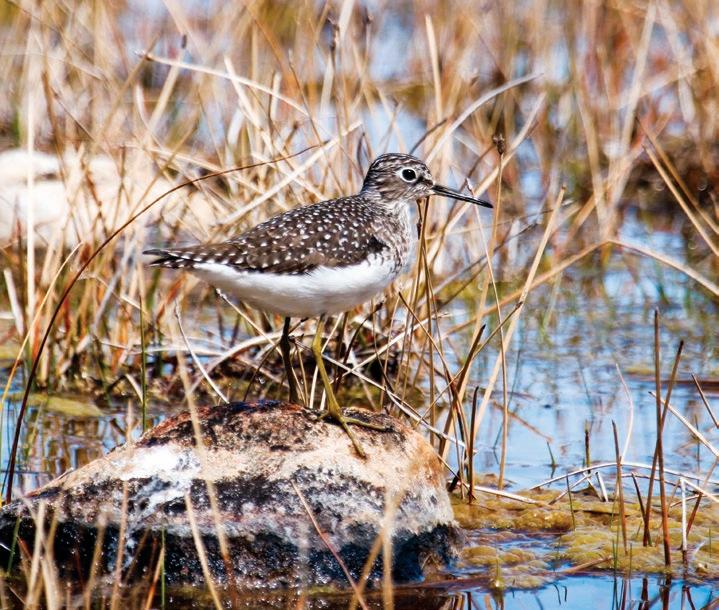

Join us for a Wildflower Walk at Hull Island in Oscoda Township this spring, when nature unfolds its colorful treasures at this newly protected place.
Stroll with our staff through scenic trails and learn about the unique world of wildflowers, from their ecological roles to cultural significance. Whether you’re a seasoned botanist or newly discovering nature’s beauty, this walk offers a chance to connect with the enchanting world of spring blooms.
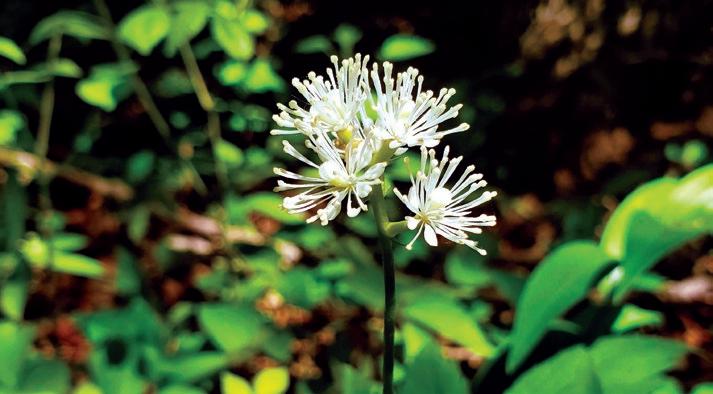
Huron Pines and the Pigeon River Discovery Center are excited to help bring the MSU Extension Michigan Naturalist North Country program back to Northern Michigan in 2024. This program aims to foster an appreciation for the natural world by providing hands-on experiences in local habitats. Participants will learn about Michigan’s unique habitats, and the plants and animals that inhabit this region. The program also covers environmental challenges and the strategies employed to mitigate them. Certification in essential natural resource conservation topics is offered upon completion as part of the Michigan Naturalist program.
This program is six monthly sessions, May through October, with classroom and field components.
Coast Watchers, a community science monitoring program focused on the health of Lake Huron, will run for its third year at Huron Pines. Coast Watchers volunteers are part of a dedicated group that monitors sections of the Lake Huron shoreline on a weekly basis from May to October to gather data. Volunteers are trained to record air and water temperature, seasonal changes in water levels, occurrences of sensitive or invasive plants, fish die-offs, storm damage and pollution. This information guides restoration efforts, while engaging local volunteers in direct science.
